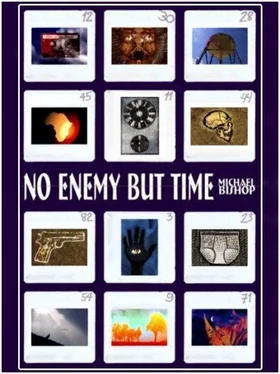This episode in recent Zarakali history had provoked worldwide interest and comment. The Times of London had run an article predicting Blair’s expulsion from the native government and his possible arraignment for criticism detrimental to the country’s best interests, but the affair had blown over in a fortnight, the President privately placating Blair by promising to restore the hominid crown to the National Museum at his death, and Blair appeasing Mzee Tharaka by agreeing to refuse public comment on the issue and to reaffirm his loyalty pledge to the old man at an open session of the National Assembly. The paleontologist had kept his promises. What Mzee Tharaka would do no one could say. He might choose to be buried wearing the crown. In the meantime, however, he was by universal acknowledgment the only head of state who periodically proclaimed his sovereignty by donning the skull of a human ancestor nearly three million years old.
“Sit,” said the President, indicating the padded swivel chairs in front of the window. “Sit, sit. Mr. Kampa is our guest. He must see that Zarakal is pursuing its future as actively as any other great nation.”
“His especial interest is the past,” Blair said.
“But not for its own sake, surely. Very few people are interested in the past for its own sake. Where we have been, gentlemen, shapes what we are. Further, it implies where we may be going.” The President patted Joshua on the hand. “Zarakal is humanity’s birthplace, young man, and it will not be a negligible factor in determining our species’ ultimate destiny.” He gestured at the merciless blue sky, at the rugged yawn of the gorge. “Here you behold the primitive but fateful beginnings of Project Umuntu, the diaspora of our evolving intelligence to the stars.”
Joshua looked out the window at the Weightlessness Simulation Incline. Three of Zarakal’s astronauts-in-training stood on the opposite ridge, paying homage to their Commander in Chief with the stiff, palm-outward salute that was a relic of the days of British colonialism. They were dwindled by distance, these trainees, but their white uniforms and tight-fitting headgear reminded Joshua of hospital workers in rubber bathing caps. Each man was standing by a large, upright barrel, and each barrel was balanced on the edge of the incline by wires connected to cables strung across the gorge like an unfinished suspension bridge. Red, yellow, and blue, the barrels appeared to be made of a hard, dent-resistant plastic. They were perforated with air holes, and at the moment their hatch covers were up, quite like toilet seats.
Looking down the counter to an official hunched over a microphone, Mzee Tharaka said, “It’s time to begin.”
“ Prepare for drop-off,” said the man at the microphone. “ One minute and counting.”
The official’s amplified voice echoed over the bleak desert landscape like the voice of God. The astronauts climbed into their capsules and closed the hatch covers.
Mzee Tharaka said, “It’s ridiculous that of all the nations of the earth only the United States of America and the Union of Soviet Socialist Republics, and perhaps the People’s Republic of China, should be trying to conquer the frontiers of space.”
“Isn’t it equally ridiculous for a nation with insufficient resources and personnel to be making the attempt?” Joshua asked. “Zarakal has more pressing business to attend to, hasn’t it?”
The President’s flinty eyes flashed, but with delight rather than disapproval. “One need not be a giant to have great dreams, Mr. Kampa. As you well know.”
“Yes, Mzee.” The shrewd old bastard.
“For just that reason, and for the reason that although Zarakal may be no giant, Africa is a colossus stirring with a newfound sense of its strength, I am the champion of African astronautics, Mr. Kampa. It was I, incidentally, who initially convinced President Kaunda of Zambia that we must put an African on the moon without the assistance of the so-called superpowers. Zambia’s fledgling space program collapsed under the weight of a staggering economy, but our program is taking wing.”
“We’ve recently replaced our obsolescent beer kegs,” said Blair, wryly, “with expertly engineered ‘descent cylinders.’”
“True, very true.” The President laughed, not at all offended. “But now we have direct American aid—not for space technologies, mind you, but for military and economic programs that will permit us to develop such. The prospect of bartering coffee, sisal, and refined petroleum products for computer technology and educational opportunities is a major step forward.”
“ Thirty seconds and counting.”
“That’s aid from a superpower, isn’t it?” Joshua remarked. “I think you’re splitting hairs on this point.”
“Well, certainly, we intend to take advantage of what others have learned through trial and error. It would be stupid to insist that we ignore existing technologies, put blinders on ourselves, and create an unadulterated Zarakali space program in the desert of our national purity. And we are not stupid, Mr. Kampa.”
To change the subject, Joshua said, “Are those barrels padded?”
“Most assuredly. Finest quality American foam rubber.”
The wires connecting the barrels to the suspension-bridge cables began slackening. The barrels themselves began rocking from side to side as their pilots prepared for launch. Through the larger holes in the capsules Joshua could see the men’s immaculate white uniforms, like bits of tissue paper in punctured cookie tins.
“ Ten, nine, eight, seven —”
“Pay attention, Mr. Kampa. The first trial run is often the most exhilarating, for the observer as well as the trainee.”
“ —three, two, one: DROP-OFF!”
The wires on the capsules yanked free, and the Zarakali astronauts came barreling down the Weightlessness Simulation Incline at a dizzying clip. The barrels bounced like balloons from some surfaces, skidded like rolling pins along others, occasionally caromed off one another like billiard balls. In a matter of seconds, it was over. The hatches on two of the barrels popped open, and their pilots wriggled out into the bottom of the gorge. The man in the remaining barrel, however, required assistance, and he was carefully extracted and led into the shade by his comrades.
“Brave men,” said Mzee Tharaka. “Very brave men.”
“Much braver than I, Mr. President.” Joshua believed it, too. All he had to do on Woody Kaprow’s Backstep Scaffold was close his eyes and dream. The time-displacement equipment and his own dreaming consciousness did the rest. It was as easy as falling downstairs.
“Not necessarily, Mr. Kampa, but perhaps you would be interested to know that many of our astronauts-in-training must overcome a powerful psychological reluctance to take part in these experiments. Tribal ways and allegiances sometimes militate against their willingness to test pilot our WSI vehicles.”
“I don’t understand.”
“These trainees are members of the Kikembu tribe. In their society, Mr. Kampa, one of the punishments reserved for sorcerers—evil persons who inflict illness or misfortune on their neighbors—quite resembles an exercise on the Weightlessness Simulation Incline.”
Joshua waited, knowing that the President intended to detail the similarity whether he replied or not.
“When the sorcerer is apprehended, you see, usually by a contingent of men who have lain in wait for him, they find an immense beehive, put the sorcerer inside it alive, seal the hive, and send it tumbling down a slope. At the bottom, Mr. Kampa, the sorcerer is invariably discovered to have given up the ghost. One of our first trainees, interestingly enough, died of fright during his maiden descent of the WSI.
Читать дальше



![Ally Carter - [Gallagher Girls 01] I'd Tell You I Love You But Then I'd Have to Kill You](/books/262179/ally-carter-gallagher-girls-01-i-d-tell-you-i-lo-thumb.webp)








